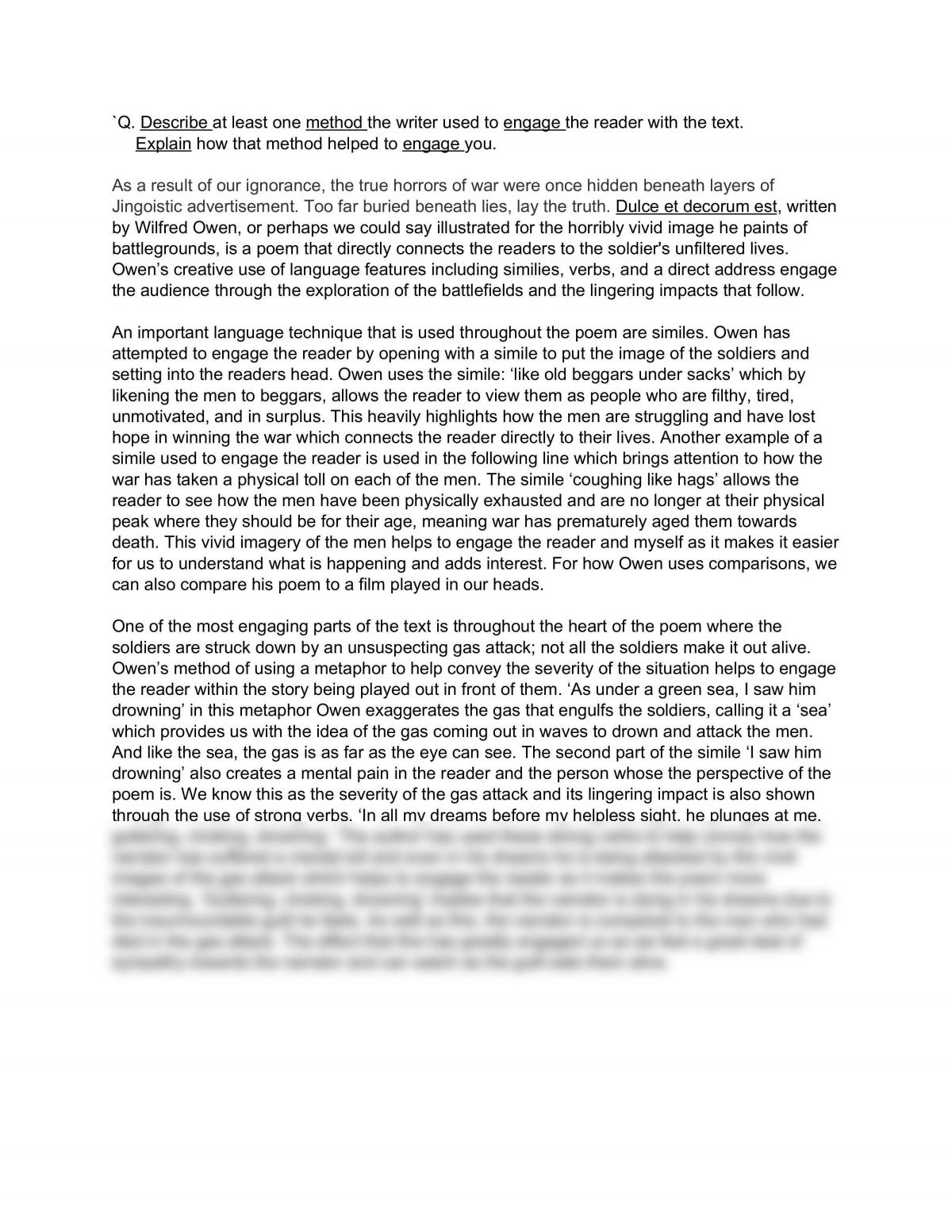The Negatively Conotated Imagery in Dulce et Decorum Est by Wilfred Owen
The bitter and condemnatory tone in “Dulce et Decorum Est” communicates that war does give a soldier glory and honor, since he often dies painfully and without the chance to make things right. On the other hand, the proud and reverent tone in “Epitaph on a Soldier” Words 5 Pages Decent Essays Preview Mood Of Dulce Et Decorum Est · August 17, by Essay Writer The poem “Dulce et Decorum Est” was written by Wilfred Owen during World War I, describing the experiences of soldiers in the trenches. The rich history behind this piece provides the reader with an even greater understanding of the scene Owen was trying to portray · This poem is based on a quotation from a Latin poem, “Dulce et decorum est – pro patria mori”, which means “It is sweet and proper to die for one’s country”. However, there is absolutely nothing in the actual poem that is sweet, nor is there any description that associates directly to its title

Dulce Et Decorum Est: Summary
In “Dulce et Decorum est” written by Wilfred Owen, and “Beach Burial” written by Kenneth Slessor, Poets criticise the reality of war through figurative language, contrasting settings, differentiating themes, contrasting poetic structure and changing tones. Neither Poets glorify war and are focused on projecting their 2 Pages Words · The aim of this essay is to present you with a portrait and analysis of the poem ‘Dulce et Decorum est’. This is a poem titled in a Latin phrase which goes on in the first verse saying ‘Dulce et Decorum est pro patria mori’. This Latin phrase borrowed by Horace, the Latin poet, means that it is sweet and ideal for one to die for his / her blogger.comted Reading Time: 7 mins · "Dulce et Decorum est" is a poem written by Wilfred Owen the famous poet and solider, who fought and died in World War 1, who is considered one of the greatest war poets of his time. The Great War resulted in more than 40 million casualties; soldiers were originally volunteers but were increasingly conscripted into service
Get professional help and free up your time for more important courses
In this regard, Remarque’s “All Quiet On the Western Front,” Otto Dix’s “Der Krieg”/“War” and Wilfred Owen’s “Dulce et Decorum Est” are analyzed. The central thesis of this paper is that all three works of art demonstrated the anti-war narrative through humanization of the war and demonstration its ruinous impact on human body and soul conditioned by its dirty, bloody and · The aim of this essay is to present you with a portrait and analysis of the poem ‘Dulce et Decorum est’. This is a poem titled in a Latin phrase which goes on in the first verse saying ‘Dulce et Decorum est pro patria mori’. This Latin phrase borrowed by Horace, the Latin poet, means that it is sweet and ideal for one to die for his / her blogger.comted Reading Time: 7 mins · The poem’s title and final lines, “Dulce et Decorum Est,” are from Horace’s Ode The bar is a Latin equivalent for “It is sweet and fitting to die for one’s country.” It echoes powerfully in the hearts of the young, showing only the heroic and romantic side of patriotic death and other sacrifices “for good.” In reality, it’s far from that

Works cited
In this regard, Remarque’s “All Quiet On the Western Front,” Otto Dix’s “Der Krieg”/“War” and Wilfred Owen’s “Dulce et Decorum Est” are analyzed. The central thesis of this paper is that all three works of art demonstrated the anti-war narrative through humanization of the war and demonstration its ruinous impact on human body and soul conditioned by its dirty, bloody and · The poem’s title and final lines, “Dulce et Decorum Est,” are from Horace’s Ode The bar is a Latin equivalent for “It is sweet and fitting to die for one’s country.” It echoes powerfully in the hearts of the young, showing only the heroic and romantic side of patriotic death and other sacrifices “for good.” In reality, it’s far from that · The aim of this essay is to present you with a portrait and analysis of the poem ‘Dulce et Decorum est’. This is a poem titled in a Latin phrase which goes on in the first verse saying ‘Dulce et Decorum est pro patria mori’. This Latin phrase borrowed by Horace, the Latin poet, means that it is sweet and ideal for one to die for his / her blogger.comted Reading Time: 7 mins
Cite this page
· “Dulce et Decorum Est” is a poem written by Wilfred Owen after his experience of fighting in World War I. The title is a Latin clause meaning it is worthy to die for one’s country. However, Wilfred Owen shares the reverse opinion, implying that it is an awful death · The poem’s title and final lines, “Dulce et Decorum Est,” are from Horace’s Ode The bar is a Latin equivalent for “It is sweet and fitting to die for one’s country.” It echoes powerfully in the hearts of the young, showing only the heroic and romantic side of patriotic death and other sacrifices “for good.” In reality, it’s far from that In this regard, Remarque’s “All Quiet On the Western Front,” Otto Dix’s “Der Krieg”/“War” and Wilfred Owen’s “Dulce et Decorum Est” are analyzed. The central thesis of this paper is that all three works of art demonstrated the anti-war narrative through humanization of the war and demonstration its ruinous impact on human body and soul conditioned by its dirty, bloody and
No comments:
Post a Comment